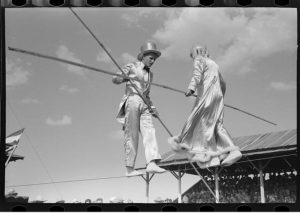 David Foster Wallace covered John McCain’s 2000 bid to become president for Rolling Stone magazine. He rode with McCain’s Straight Talk Express for a week and wrote a 15,000 + word essay that took a look at everything from the campaign’s catering to its political strategy. Wallace, a keen American essayist, humorist, and novelist, studies McCain’s campaign from the eyes of a young, 20-something American who is not only fed-up with the political system, but bored to tears by it. He argues that generation X, the segment of people born after 1970, have trouble accepting, embracing, and supporting leaders because, well, their skin is too thick for marketing gimmicks, emotional appeals, and political promises. Or, as Wallace says, younger voters can’t identify with political leaders because they instinctively sense “bullshit.”
David Foster Wallace covered John McCain’s 2000 bid to become president for Rolling Stone magazine. He rode with McCain’s Straight Talk Express for a week and wrote a 15,000 + word essay that took a look at everything from the campaign’s catering to its political strategy. Wallace, a keen American essayist, humorist, and novelist, studies McCain’s campaign from the eyes of a young, 20-something American who is not only fed-up with the political system, but bored to tears by it. He argues that generation X, the segment of people born after 1970, have trouble accepting, embracing, and supporting leaders because, well, their skin is too thick for marketing gimmicks, emotional appeals, and political promises. Or, as Wallace says, younger voters can’t identify with political leaders because they instinctively sense “bullshit.”
Voters born after 1970 grew up with marketing, advertising, and sales pitches. Wallace argues that voters “below the age of 35” can “smell” the self serving interests a political candidate has when they ask for votes. No matter what they promise. He says, “We [generation X] may vote for [leaders] the same way we may go buy toothpaste. But we’re not inspired. They’re not the real thing.” For Wallace this ‘sales’ aspect of leadership is nothing new. What’s new is people’s growing ability to “smell” marketing before feeling inspiration, to identity the salesman before the message.The post-1970 generation was raised with commercials and can’t help but look at the political process as one big commercial.
Wallace argues that young voters are instinctively aware of a leader’s inherent self-interest. Since this is the case, young voters can’t be inspired since they are too busy waiting to get let down. As he sees it no leader has been able to reverse this formula since 1970. Of course Wallace, writing in the Spring of 2000, doesn’t take into account President Obama, his campaign, and his popularity among young voters.
Wallace’s argument is half right. Younger voters and younger employees are forced, to a degree, to view leaders on any stage with some distrust and cynicism. Campaigns appear as commercials and leaders appear to act with self interest. It’s a stance that’s been adopted to deal with advertising overload and marketing blitzes. It’s a tension that both political and business leaders must consider when they try to talk to young voters or employees. Today’s leaders have to find a way to express their desire for action while stating their self interests clearly.
Here’s how Wallace defines leaders: “A real leader can somehow get us to do certain things that deep down we think are good and want to be able to do but usually can’t get ourselves to do on our own. It’s a mysterious quality, hard to define, but we always know it when we see it, even as kids.” Wallace can’t put his finger on what a real leader is. He describes what leaders can do, but he explains the ‘how’ of leadership as a “mysterious quality.” Ultimately identify a leader, under Wallace’s rubric, comes down to a 6th sense. A preternatural gift you probably had since you were a kid.
Wallace stumbles in his definition of leadership. If leadership is to remain a murky ability, a “mysterious quality,” then not only young voters, but everyone, is forced to approach campaigning leaders with caution. If leadership is truly indefinable and only felt how can we trust, measure, and promote aspiring leaders? We can’t with any reliability and we’re forced to study leaders using a language of cliches. When we can’t explain leadership, we have to ask about a leader’s ability to inspire or the amount of charisma they have–and we get more confused.
If Wallace looked at leadership as the ability the get things done, he’d have less anxiety about trusting or believing in potential leaders and politicians. Wallace says the discussion of leadership makes “eyes glaze over” because it involves discussing abstract qualities and contradictory personality traits. But leadership isn’t a set of indefinable traits and mysterious qualities, it’s a muscle that can be seen and exercised. Leadership is about execution, building coalitions, bargaining, building legitimacy and so much more.
Wallace rightly asserts that young people are skeptical about aspiring leaders. They have trouble discerning between marketing and a real promise. But the main reason leadership worries people is because it lacks a consistent definition. When Wallace argues that leadership is a “mysterious quality” it’s easy to be skeptical of leaders since we don’t even know where to begin trusting them or perceiving them. We’d be able to support the right leaders if we were able to measure their ability to get things done and execute. It’s crucial that we define leadership as a real set of skills rather than a hazy combination of personal qualities.
Pic Credit: Steve Rhodes



